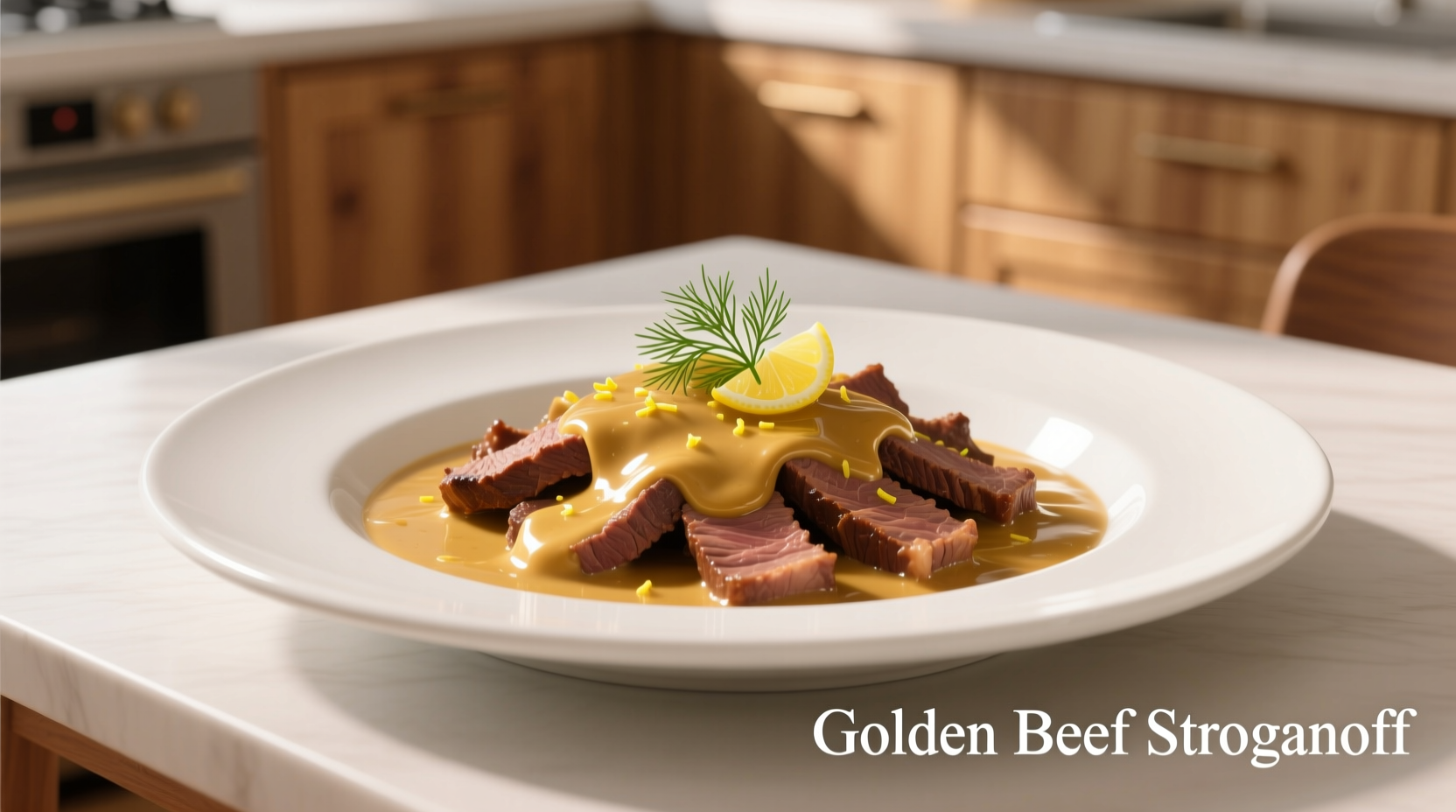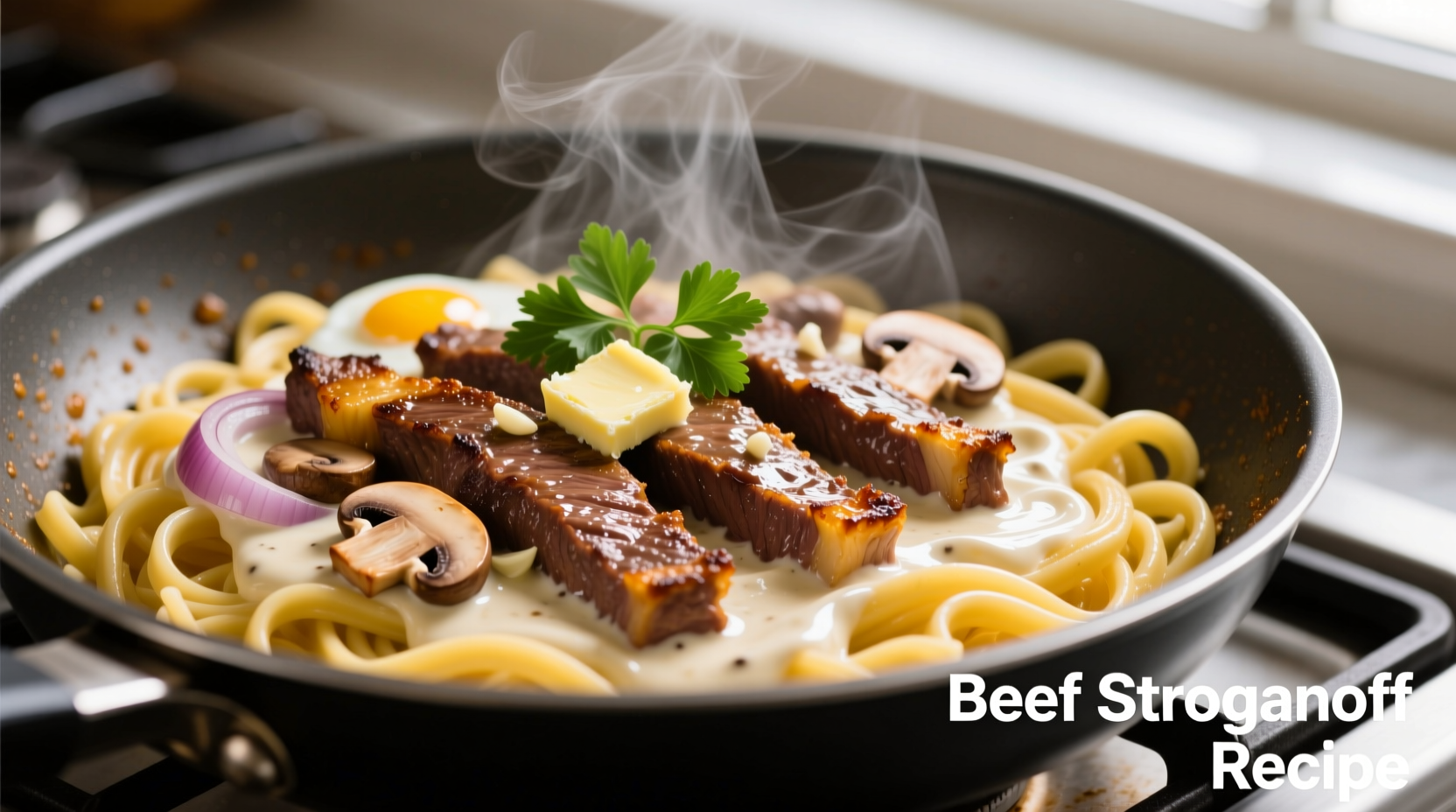Learn how to cook authentic beef stroganoff with this step-by-step guide. You'll get tender beef in a rich sour cream sauce with mushrooms and onions, ready in under 45 minutes. Perfect for weeknight dinners or special occasions with proper searing technique, sauce consistency, and traditional Russian serving suggestions.
The Story Behind Your Beef Stroganoff
Beef stroganoff isn't just another comfort food—it's a culinary artifact with roots tracing back to 19th century Russia. Contrary to popular belief, this dish wasn't created in America but originated in the Stroganov household, one of Imperial Russia's wealthiest families. The original recipe, documented in "The Book of Tasty and Healthy Food" (1952), featured tender beef strips in a mustard-brandy sauce with sour cream—no tomato paste or Worcestershire sauce that many modern versions include.
Beef Stroganoff Evolution Timeline
- 1840s: First appears in Russian aristocratic kitchens, likely created by French chefs employed by the Stroganov family
- 1891: Published in Elena Molokhovets' "A Gift to Young Housewives", Russia's definitive cookbook of the era
- 1950s: Gains international popularity after being featured in Soviet-era cookbook distributed worldwide
- 1970s: Americanized versions emerge with added tomato paste and egg noodles becoming standard
Why This Recipe Works
Most beef stroganoff recipes fail by either boiling the sour cream (causing curdling) or using low-quality beef that turns tough. This method solves both problems through precise temperature control and strategic ingredient sequencing. The key is understanding that sour cream must never reach boiling point—85°C (185°F) is the critical threshold before dairy proteins coagulate and separate.
Essential Ingredients for Authentic Flavor
Quality ingredients make the difference between ordinary and exceptional stroganoff. Here's what you need:
| Ingredient | Authentic Choice | Common Substitutes | Why It Matters |
|---|---|---|---|
| Beef | Sirloin or tenderloin (1" cubes) | Round steak (requires velveting) | Tender cuts withstand quick cooking without toughening |
| Dairy | 30% fat sour cream | Crème fraîche | Higher fat content prevents curdling |
| Liquid | Beef stock + 2 tbsp brandy | Dry white wine | Brandy's caramel notes balance sour cream's tang |
| Thickener | Beurre manié (equal parts butter/flour) | Cornstarch slurry | Creates silky texture without floury taste |
Equipment Checklist
- 12-inch heavy-bottomed skillet (cast iron or stainless steel)
- Instant-read thermometer (critical for perfect searing)
- Wooden spoon (won't scratch pan during deglazing)
- Small bowl for sour cream tempering
Step-by-Step Cooking Process
Preparation Phase (10 minutes)
- Cut 1.5 lbs beef sirloin into 1-inch cubes, removing all visible sinew
- Pat meat completely dry with paper towels (moisture prevents proper searing)
- Mix 2 tbsp Dijon mustard with 2 tbsp brandy in small bowl
- Prepare beurre manié: knead 2 tbsp softened butter with 2 tbsp flour
Cooking Sequence (25 minutes)
- Heat 2 tbsp oil in skillet to 190°C (375°F)—test with bread cube (should sizzle immediately)
- Sear beef in single layer (don't crowd pan) for 90 seconds per side until golden
- Remove beef, add 1 diced onion and 8 oz sliced mushrooms, sauté until caramelized (8 minutes)
- Return beef to pan, add 1 cup beef stock, bring to simmer
- Whisk in beurre manié until sauce thickens (3-4 minutes)
- Reduce heat to 75°C (167°F), stir in mustard-brandy mixture
- Temper sour cream: whisk 1 cup sour cream with 2 tbsp hot sauce, then slowly incorporate
- Return beef to pan, heat through (do not boil) until 70°C (158°F) internal temperature

Avoid These 3 Common Mistakes
- Sour cream curdling: Always temper sour cream with hot liquid first and keep temperature below 85°C (185°F)
- Tough beef: Never cook beyond medium-rare (57°C/135°F) as residual heat will continue cooking
- Watery sauce: Use beurre manié instead of flour directly to avoid lumps and ensure proper thickening
Serving Authentic Russian Style
While egg noodles dominate American versions, traditional Russian stroganoff serves over buckwheat (kasha). The nutty flavor complements the rich sauce perfectly. For optimal experience:
- Plate immediately—stroganoff deteriorates quickly off heat
- Garnish with fresh dill (never parsley) and extra sour cream dollop
- Serve with dark rye bread for sauce absorption
- Pair with chilled vodka or dry Riesling to cut through richness
Storage and Reheating Guidelines
Beef stroganoff maintains quality for 3 days refrigerated but requires special reheating:
- Never microwave—use double boiler method with water bath
- Stir constantly while reheating to prevent dairy separation
- Add splash of beef stock if sauce thickens too much
- Freeze without sour cream; add fresh when reheating
Regional Variations and Limitations
Understanding context boundaries prevents culinary missteps. Certain adaptations work while others fundamentally alter the dish:
| Variation | Acceptable? | Reason |
|---|---|---|
| Mushroom substitution (shiitake) | Yes | Enhances umami without changing profile |
| Tomato paste addition | No | Creates Americanized version, not authentic |
| Coconut milk instead of sour cream | No | Changes fundamental flavor profile |
| Using ground beef | No | Original recipe specifies cubed tender cuts |
Perfecting Your Technique
Professional chefs achieve restaurant-quality results through these advanced methods:
- Velveting beef: For less tender cuts, marinate in 1 tbsp baking soda + 2 tbsp water for 20 minutes before cooking
- Sauce consistency test: Should coat back of spoon and leave clear path when finger drawn through
- Temperature control: Use instant thermometer to maintain 75-80°C (167-176°F) during final assembly
Troubleshooting Guide
Fix common issues before they ruin your meal:
- Sauce too thin: Simmer uncovered 2-3 minutes or add additional beurre manié
- Sauce too thick: Whisk in beef stock 1 tbsp at a time
- Sour cream curdled: Immediately remove from heat, add ice cube, and blend with immersion blender
- Beef tough: Next time reduce searing time and use more tender cut











 浙公网安备
33010002000092号
浙公网安备
33010002000092号 浙B2-20120091-4
浙B2-20120091-4